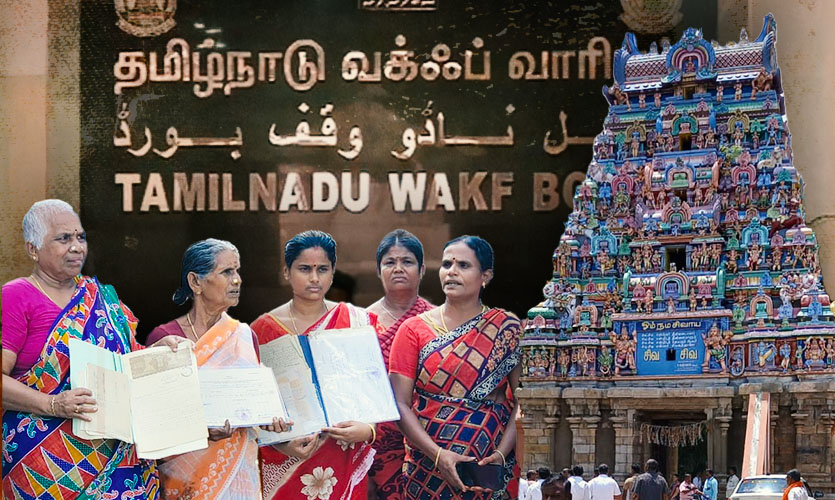The Tamil Nadu Waqf Board has recently claimed ownership of the entire Thiruchendurai hamlet, shocking the inhabitants. Thiruchenthurai is a village on the Cauvery River’s bank, in Tiruchirapalli district. It also has a 1,500-year-old Sundareswarar Temple, which some are wondering how the Waqf can claim ownership of, since Islam originated only 1300 years ago.
The villagers were taken aback when a landowner, Rajagopal of Mullikarupur, was informed by local officials on Wednesday that his 1.2-acre tract of land belonged to the Tamil Nadu Waqf Board, and that he needed to get a No Objection Certificate (NOC) from them in order to sell it. He had agreed to sell his land to one Rajarajeshwari, and had gone to the Joint III Sub-Registrar office in Trichy to negotiate and register the purchase document.
According to the Waqf Board, they have issued a letter to the Registration Department, accompanying it with documentation, and informing them that the entire hamlet is their property. They require a NOC for anyone intending to register a sale deed for any land in the hamlet. In addition, Rajagopal received a copy of the Waqf Board’s 250-page letter, claiming property ownership. In the letter, the Waqf Board indicated that they owned several tens of thousands of acres in Tamil Nadu. The office subordinate reports that the entire hamlet of the registrar belongs to the Waqf Board, and anyone interested in selling the property must obtain a NOC from Chennai. Similar situations exist in 17 other communities.
Upon returning to Thiruchendurai village, Rajagopal explained his ordeal to other inhabitants who are now concerned about the takeover of their lands by the Waqf Board. They have questioned how the Waqf Board claim Thiruchenthurai village when the inhabitants have already obtained the revenue department’s documents such as the patta, chitta, and adangal, as well as revenue ‘A’ registrations and encumbrance certificates. When the district collector was uprised of this issue, he promised to investigate the matter and take appropriate action.
Those who were skeptical of the claims quickly lined up outside the district administration’s headquarters. It was proven that Muslims were resettled in the area in 1927-1928, and there was no evidence of Muslims living there before then. Furthermore, no information was found regarding Muslim property ownership in the area. The Waqf Board, on the other hand, has sent a 20-page letter to Trichy’s 12 registration offices, claiming land in many districts.
M Abdul Rahman, head of the Waqf Board, told India Today:
“In our Waqf Board records from 1954, the government surveyed land information is properly registered. As per the information, we have sent details to the sub-registrar’s office with survey numbers or village names. That village is a vast area. Any details for a limited property can be easily provided but this is a vast property and has several details that need to be sent. We don’t want to prolong confusion till we provide full records from the archive.”
According to the Waqf Board, they own 389 acres of land that was surveyed by government-approved surveyors in 1954 and recognised as Waqf property.
“We will furnish details from the archive and give it to the sub-registrar’s office. People will be able to continue their operations on the land but won’t be able to claim ownership of it,” said Rahman.
In response to allegations that the board had seized religious property, he stated, “We are proud that Waqf property was given to construct temples and temple ponds. We have given 300 acres to a Hindu farmer for agriculture.” However, the chairperson noted that they are unable to offer a specific time frame for when all land ownership information would be released.
Allur Prakash, a BJP leader from Trichy, said that Thiruchendurai village is a scenic agricultural community located on the south bank of the Cauvery River, with a big Hindu population. He questioned,“What is the relationship between the Waqf Board and Thiruchendurai Village?”
“There is the Manendiyavalli Sametha Chandrasekhara Swamy temple, which has a ‘paadal petra sthalam‘. Various documents and evidence suggest that this temple is 1,500 years old. The temple owns 369 acres of land both inside and outside Thiruchendurai village. Does this temple land also belong to the Waqf Board?” he added.
According to a Tamil Nadu Government Registration Department employee, there are encroachments on water bodies, Waqf Board holdings, and religious properties. The agency claims to have acquired information that unconnected people acquired ownership of these lands through fraudulent paperwork, with many of them entangled in legal issues.
“The court criticised the government on the issue and directed to take appropriate steps to recover the assets. Based on that, in 2016, the government took measures to recover the assets. Following this, the Waqf Boards stepped in to recover their properties all over Tamil Nadu. It has sorted out what it found to be its assets and notified them to the department. It has also asked the registration department to stop any arrangement for registration of deeds in respect of certain properties. It is on this basis that entire villages including Thiruchendurai and Kadiakurichi have been identified as Waqf Board properties,” said the Registration Department official.
Reportedly, department officials will meet with the secretary of the Minority Welfare Department, and the chairman of the Waqf Board. They agreed that referring to the Thiruchendurai temple and its lands as Waqf Board property is absurd, and that they have had problems when deed registrations have had to be disallowed based on the Waqf Board’s letters.
Read more: RSS Demands Nationwide Population Control Bill; Here’s All You Need To Know










